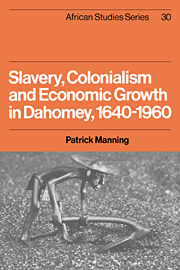Book contents
- Frontmatter
- Contents
- Maps
- Tables
- Figures
- Preface
- 1 Slavery, colonialism and economic growth, 1640–1960
- 2 The Dahomean economy, 1640–1890
- 3 Struggles with the gods: economic life in the 1880s
- 4 Production, 1890–1914
- 5 Demand, 1890–1914
- 6 Exchange, 1890–1914
- 7 The alien state, 1890–1914
- 8 Social struggles for economic ends, 1890–1914
- 9 The mechanism of accumulation
- 10 Capitalism and colonialism, 1915–60
- 11 The Dahomean national movement
- 12 Epilogue
- Notes
- Appendix 1 Export revenue from Dahomey, 1640s–1950s
- Appendix 2 Slave exports by ethnic origin
- Appendix 3 Population loss due to slave exports
- Appendix 4 Foreign trade of Dahomey
- Appendix 5 Foreign trade indices
- Appendix 6 Rainfall
- Appendix 7 Fiscal flows
- Appendix 8 Money supply of colonial Dahomey
- Bibliography
- Index
3 - Struggles with the gods: economic life in the 1880s
Published online by Cambridge University Press: 26 October 2009
- Frontmatter
- Contents
- Maps
- Tables
- Figures
- Preface
- 1 Slavery, colonialism and economic growth, 1640–1960
- 2 The Dahomean economy, 1640–1890
- 3 Struggles with the gods: economic life in the 1880s
- 4 Production, 1890–1914
- 5 Demand, 1890–1914
- 6 Exchange, 1890–1914
- 7 The alien state, 1890–1914
- 8 Social struggles for economic ends, 1890–1914
- 9 The mechanism of accumulation
- 10 Capitalism and colonialism, 1915–60
- 11 The Dahomean national movement
- 12 Epilogue
- Notes
- Appendix 1 Export revenue from Dahomey, 1640s–1950s
- Appendix 2 Slave exports by ethnic origin
- Appendix 3 Population loss due to slave exports
- Appendix 4 Foreign trade of Dahomey
- Appendix 5 Foreign trade indices
- Appendix 6 Rainfall
- Appendix 7 Fiscal flows
- Appendix 8 Money supply of colonial Dahomey
- Bibliography
- Index
Summary
The preceding chapters, in their emphasis on long-range developments, have perhaps encouraged the reader to view those changes as smooth and gradual transitions. But if the transformations of centuries appear to have been smooth, the fluctuations of individual years were jarring. The ‘normal year’ never takes place: one always places it in either the future or the past. Nor is the sweep of human history independent of the events of any year. Rather it is the result, over the passage of centuries, of innumerable tiny events, conflicts and processes, each insignificant in itself and unrelated, apparently, to most others – yet in the aggregate these many events lead to occasional periods of rapid change. The importance of the short run in history, further, is seen perhaps more clearly from the perspective of the individual than from that of the society: man, unlike the societies he constructs, does not live in the long run. He cannot be content to take the long view of society when faced with the pressing needs of subsistence and the desires for economic and social advance. Each year's changes in many arenas are of vital importance to his well-being, and they are of concern as well to the historian who would know the structure of society and the processes of its change. This is as true for Africa, where the documentation on daily life is often meagre, as it is for Europe and North America, where such documentation is at times overwhelming.
- Type
- Chapter
- Information
- Publisher: Cambridge University PressPrint publication year: 1982



